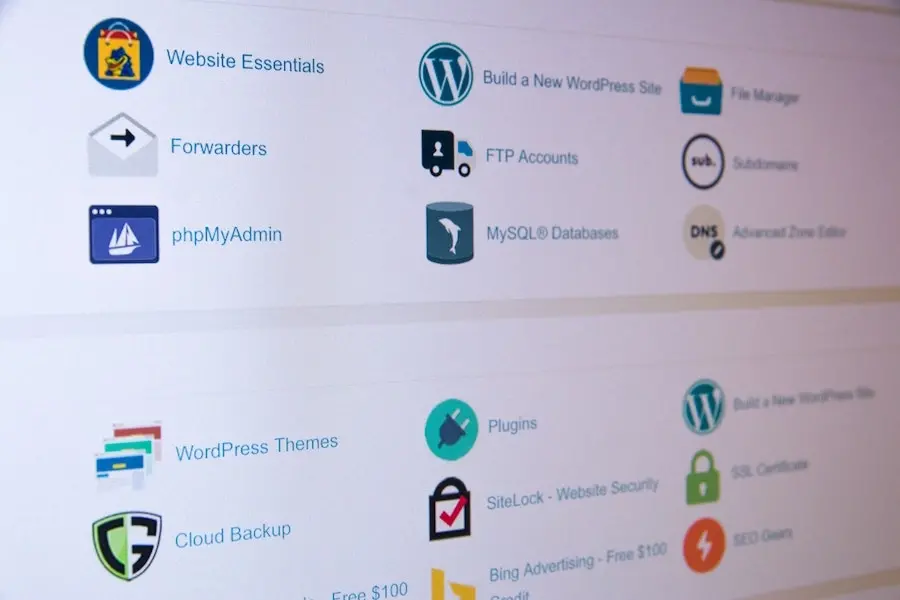Self-hosting is an increasingly popular option for those who want to take control of their online presence and create a website or web application that they own and manage themselves.
WordPress is by far the most popular platform for building sites on, too.
According to W3Techs, WordPress accounts for 43.2% of all websites as of 2023.
And when you factor in only sites using content management systems (CMS), that market share leaps up to 78.65%
With self-hosting, you host your website with a reliable hosting provider where you manage the site yourself. This is in contrast to opting for a hosted platform where you have little to no control over your site in the long term.
Self-hosting gives you complete control over the features, functionality, design, and performance of your site.
In this article, we'll discuss what self-hosting is and why it's a popular choice for businesses and individuals alike.
What is Self-Hosting?

Image source: Unsplash
Self-hosting, also referred to as unmanaged hosting, describes when you host your website on a server that you control. This means that you don’t have to rely on a hosted platform or website builder and can customize the server environment to meet your needs.
For clarity’s sake, managed cloud servers can be self-hosted as well, but the web host takes care of the server management, installation and maintenance on your behalf, plans for which are more expensive.
Self-hosting is ideal for most people who want more control of their websites and don’t want to be stuck with a website builder platform forever.
How Does Self-Hosting Work?
Self-hosting is the practice of running and maintaining a website using a web server yourself. It is also known as unmanaged hosting. This means that the user is responsible for setting up, configuring, and maintaining every aspect of running a website.
The process of self-hosting starts with selecting a web host provider. The provider will give access to a server where the user can install an operating system and other necessary software components.
Once the server has been set up, users can then install their website files and configure them to run on their own domain name.
Next, you can manage your own web server by performing tasks like updating software, creating backups, optimizing performance, and monitoring security. These tasks are essential for keeping the website running smoothly and securely.
What Are the Advantages and Disadvantages of Self-Hosting?
Advantages
Disadvantages
What Are the Benefits of Self-Hosting?
Self-hosting offers many advantages over traditional hosting services, including the following:
Full Control Over Your Site
One of the biggest benefits of self-hosting is that you have full control over your website. You can make changes to your site whenever you want without having to wait for approval from a hosting provider.
Fully Monetizable
Some hosted platforms that use dedicated website builders don't allow for monetization (or charge extra fees to do so).
Going the self-hosted route means you can do with your site as you wish -- including starting up an online store or earning affiliate income.
Greater Flexibility
With self-hosting plans, you can install whatever software or plugins you need to create a unique experience for visitors without having to worry about compatibility issues or restrictions imposed by hosted platforms.
This allows you to create an engaging and interactive experience for users that will help keep them coming back again and again.
Reduced Costs
Costs are typically lower when you self-host as well. This lowers the barrier of entry for those looking to capture a piece of the growing audience of Internet users -- which topped 4.5 billion in 2020, according to We Are Social.
What Are the Disadvantages of Self-Hosted Websites?
Self-hosted websites can also come with some drawbacks. Let’s review those now:
Time Investment
The most notable drawback is the time spent. With self-hosting, users are responsible for all aspects of their website and must spend time managing the server, software updates, backups, and security.
This can be a major commitment of both time and resources that some people may not be able to make.
Potential for Greater Costs
And though self-hosted or unmanaged plans cost less at the outset, the long-term costs associated with managing your own site can quickly add up. If there's an issue, you might need to end up hiring a professional to fix it.
Whereas a hosted platform would have such protection built into your standard monthly or annual costs.
Technical Expertise Required
Additionally, self-hosting requires users to have a certain level of technical expertise in order to properly manage and maintain their websites. If users are not tech-savvy, they may have difficulty navigating the complexities of setting up a web server or running updates on their own.
And when users expect a certain level of performance, failing to meet those expectations can be detrimental to your site's success.
For instance, 40% of people online think websites should load within a couple of seconds. If you don't know how to optimize your site, a managed plan is likely a better option.
What is the Difference Between Hosted and Self-Hosted?
Hosted and self-hosted websites are two different types of website platforms. Hosted websites are established on a server where you have little to no control over server-side decisions about your site. These platforms usually take the form of a website builder like Wix, Squarespace, or WordPress.com that provide an inclusive solution for creating and managing websites.
Self-hosted websites, on the other hand, take a more do-it-yourself approach. You need to buy a domain name, pay for someone to host it, and install the CMS software of your choice.
With self-hosting, you have more control over the design and functionality of your website. It does require more technical knowledge and effort to set up, but you ultimately own your site fully. If you ever wish to move to a new host, you can.
With a hosted site, you can’t do that – at least not very easily. You are essentially “locked in” to the host and builder.
What is an Example of Self-Hosting?
Often, it's best to illustrate concepts to gain a better understanding of them. So let's say you want to build a website about pet care. You need a domain name, hosting, and content management system (CMS) to manage your content.
Through self-hosting, you would need to purchase hosting space and a domain name from a provider like Verpex and then install WordPress on it. Then, you'd be able to customize the look of your website with a theme and plugins you select, install, and configure.
You'll also be responsible for keeping your website secure and up-to-date, performing backups, and troubleshooting server issues. Self-hosting is a hosting plan that is unmanaged.
What is a Self-Hosted Blog?
A self-hosted blog is a blog that you host yourself. This means you have full control over how your site functions and looks. You can customize it as you wish and even move it to a different hosting company at a later date if you want.
Self-hosting offers more flexibility and control over your blog. You can choose from a variety of themes and plugins to make your site stand out from the crowd.
You also have access to more advanced features such as SEO optimization and analytics tracking.
Self-hosting also allows you to monetize your blog with ads, affiliate links, or an eCommerce store if you choose. It shares this in common with managed hosting plans, too.
With a hosted website builder, you may be limited in what types of monetization methods are available.
Overall, self-hosting with a decent web hosting provider offers more freedom and control over your blog than hosted website builders do. It’s an excellent choice for those who want to create an engaging and successful online presence for their business or brand.
How Much Does it Cost to Self-Host a Website?
Self-hosting, or unmanaged hosting, is a cost-effective way to manage your own website. The cost of self-hosting varies depending on the type of hosting you choose and the services you require.
Generally speaking, self-hosted plans are very affordable.
How Do I Self-Host My Domain?
Hosting your own domain is a great way to have full control over your website and ensure that it runs smoothly. To self-host your domain, you need to purchase a domain name, select a hosting provider, choose a hosting plan, and configure the DNS settings.
Step 1
If you've already purchased a domain name, go to the site where you purchased it, log in, and access your account settings. Locate the DNS Management or Name Server Settings. Keep this open in a tab.
Step 2
Next, select a hosting provider and a self-hosting plan that best fits your needs. There are many different types of hosting plans available such as shared web hosting, virtual private server (VPS) hosting, dedicated server hosting, cloud computing services, and more.

Step 3
Input the name servers provided by your hosting provider. This will allow you to connect your domain to the hosting account.
If you've yet to purchase a domain name, you can always get a hosting plan and domain at the same time, which can help bypass some of these configuration steps.
Is Self-Hosting the Right Choice for Your Website?
Self-hosting is a great choice for those who want to create an engaging and successful website or blog. It gives you full control over your website, from design to functionality, and allows you to monetize it easily, if desired.
And you can serve yourself well by investing in a hosting plan from a reputable company like Verpex Hosting. Our self-hosted plans are available in a variety of configurations including cloud hosting and hosting for WordPress.
Frequently Asked Questions
Is hosting free?
There are many different hosting plans on the market, and some of them offer a free hosting option.
Is web hosting profitable?
Web hosting is a profitable business since you don’t need a big investment in order to run it.
Does a website need hosting?
Yes. In order for a site to be accessed by outside users, it needs to have website hosting.
Who should use general web hosting?
Anyone running a small business, those on a budget, bloggers, and hobbyists.

Brenda Barron is a freelance writer and editor living in southern California. With over a decade of experience crafting prose for businesses of all sizes, she has a solid understanding of what it takes to capture a reader's attention.
View all posts by Brenda Barron




















